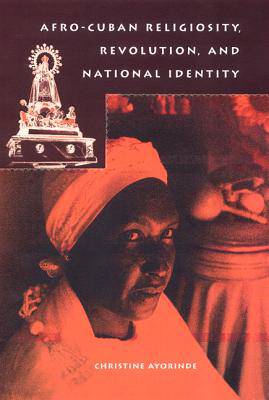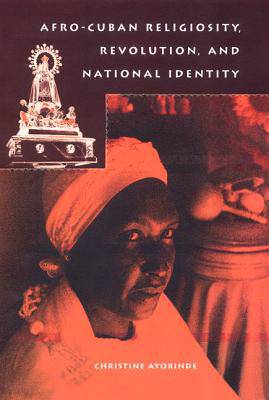
- Retrait gratuit dans votre magasin Club
- 7.000.000 titres dans notre catalogue
- Payer en toute sécurité
- Toujours un magasin près de chez vous
- Retrait gratuit dans votre magasin Club
- 7.000.000 titres dans notre catalogue
- Payer en toute sécurité
- Toujours un magasin près de chez vous
Description
Afro-Cuban religions--especially the practice of santería, based on West African traditions--are an essential aspect of contemporary Cuban identity, Christine Ayorinde argues, and their existence has forced the current revolutionary state into bizarre and contradictory positions. Ayorinde's bold assertion confounds official pronouncements about the irrelevance of religion in a modern socialist state. The revolutionary leadership has acknowledged the centrality of Cuba's African heritage, while upholding the idea of a nationhood that transcends racial difference. Ayorinde proposes that the conflict between the desire to recognize the country's African roots and the official commitment to a secular state has created a complex, often paradoxical situation. Despite an ideological campaign to create a new, rational society, African-derived religions are emerging today for the first time from a position of marginality. Cuba now is beset with a sense of disorientation as well as a return to old habits and patterns, including racial inequality. Based mostly inside Cuba, Ayorinde's research includes interviews and conversations with individual Cubans, including practitioners of Afro-Cuban religions from different ethnic backgrounds. Some are movers and shakers in the liberal debate about contemporary religion, some are new initiates, others have been practicing for 50 years or more. Some have been members of the Communist Party; others never have been, and make their living from the practice of their religion. Ayorinde also interviewed both religious and atheist commentators on Afro-Cuban religions and culture, including academics, journalists, party officials, and members of governmental and nongovernmental institutions, many at the forefront of efforts to give santería greater recognition as a central component of the national culture. In addition, the book offers a fresh historical overview of changing religious forms and attitudes in Cuba, examining the encounter with European culture and the Roman Catholic Church, religious practice among slaves in the 19th century, the concept of racial fraternity articulated by Cuban patriot José Martí, and the witchcraft scares of the early decades of the 20th century, when religious practices were associated with criminality. Its emphasis on the period since 1959 and on the current decade, in which the government has begun to rethink aspects of the revolution, places it on the cutting edge of studies that examine contemporary Cuban culture.
Spécifications
Parties prenantes
- Auteur(s) :
- Editeur:
Contenu
- Nombre de pages :
- 283
- Langue:
- Anglais
- Collection :
Caractéristiques
- EAN:
- 9780813027555
- Date de parution :
- 31-12-04
- Format:
- Livre relié
- Format numérique:
- Genaaid
- Dimensions :
- 161 mm x 232 mm
- Poids :
- 548 g







